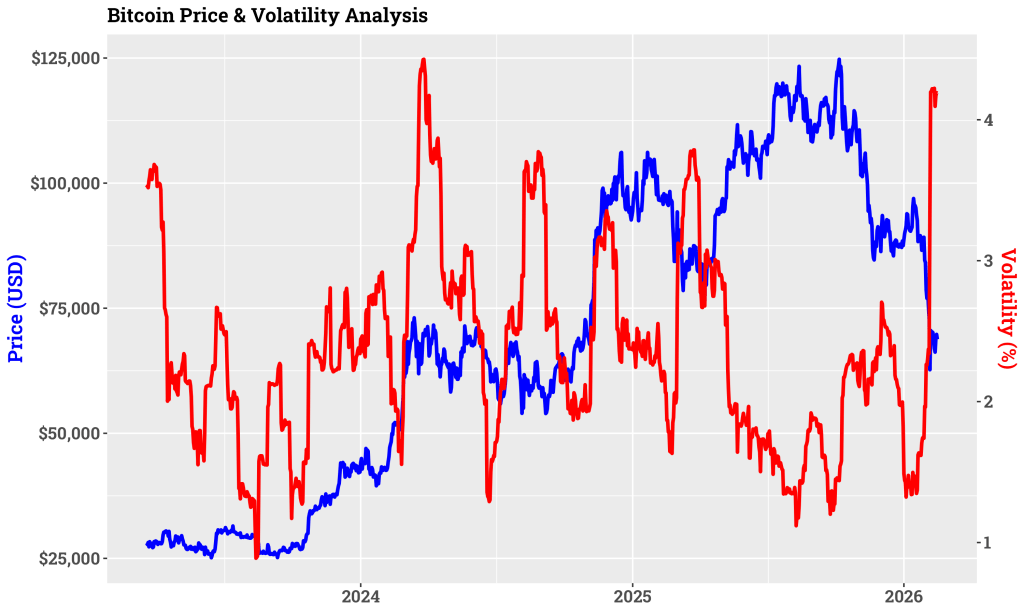
As of this week, we are closing our forum at discuss.ropensci.org.
The forum has become largely inactive in recent years, so we are consolidating our conversations to our other online spaces to reduce maintenance and moderation burden.
We’re not... [Read more...]
Football Betting Model in R (Step-by-Step Guide 2026)
Related (on this site): Install & Use worldfootballR worldfootballR Guide Sports Analytics with R NFL Analytics with R Tennis Analytics with R Boxing Analytics with R Bayesian Sports Analytics (Book/Product) Contents Setup Get match data Feature engineering Model 1: Poisson goals (baseline) Model 2: Dixon–Coles adjustment (improves low scores) From scorelines ... [Read more...]
Forget Clicks: Why CTR Is a Terrible Metric for Ad Effectiveness
Short practical advice on ad measurement:
Don’t optimize for CTR alone — The paper shows clicks are a poor proxy for conversions. Across many campaigns, targeting models built on clicks perform no better than random guessing at identifying who... [Read more...]
Open REDATAM a un anio de su publicacion
A un año de la publicación del artículo sobre Open REDATAM, reflexiono sobre el proceso de publicación, la recepción de los usuarios, la revisión en rOpenSci y los desafíos técnicos y personales. [Read more...]
Welcome, Nick Masel
Hi pharmaverse community,
On behalf of the council we are pleased to announce that Nick Masel will be taking over from Sumesh Kalappurakal as the J&J representative on the Pharmaverse Council. Please join us in thanking Sumesh for his lead...

Quantitative Horse Racing with R: Calibration, Backtesting, and Deployment
R DuckDB Parquet Calibration Ranking Bayesian Odds TS Backtesting Racing analytics as an inference-and-decision system Thoroughbred flat racing is not a binary classification problem. It is a multi-competitor outcome process with hierarchy (horse / trainer / jockey / track), time dependence (form cycles, market moves), and decision layers (how you act on probabilities). ... [Read more...]
You can do more for neural networks in R with {kindling}
This post has been written in collaboration with Joshua Marie.
Why this post matters
Neural networks in R are no longer niche. Today, we can choose among:
{nnet} for classic, small-scale neural nets,
{neuralnet} another classic neural nets packag...

Keeping files organised for publication
Getting files ready for publication can be frustrating when you can’t find the right file, or you realize your figures look like 2000s jpeg.
Here’s a list of things I wished I’d done (or my students had done) properly earlier in the paper prep p... [Read more...]
Jumping Rivers Now Approved to Sell Services Through DOS7: Crown Commercial Services
Jumping Rivers has been approved to sell our services through the Crown Commercial Service CCS.
For UK public sector organisations, this is an important milestone. It means there is now a simpler, compliant way to work with us without going throu...

Pacific diaspora by @ellis2013nz
This post is the fourth of a series of (probably) seven on population issues in the Pacific, re-generating the charts I used in a keynote speech before the November 2025 meeting of the Pacific Heads of Planning and Statistics in Wellington, New Zealand...

Modeling Bitcoin Volatility Through Structural Breaks: A Compositional Perspective
Recent advances in time series modeling have emphasized the importance of structural breaks—abrupt changes in the underlying dynamics of financial or economic data. The paper “Directional-Shift Dirichlet ARMA Models for Compositional Time Series with Structural Break Intervention” (Katz, 2026) introduces a Bayesian framework that captures these breaks using three interpretable ...

A Star is Born: Why GitHub Stars Are Vital to the Pharmaverse
The Smallest Contribution You’re Probably Not Making
You’ve used {admiral} to derive your ADSL. You’ve leaned on {metacore} to wrangle your metadata. You’ve validated your XPT files with {xportr} and scored your package risk with {riskmetric}...

What’s new in flextable 0.9.11
‘patchwork’ integration
Aligning rows with flex_body
Aligning columns with flex_cols
Quarto markdown in cells
‘flextable’ 0.9.11 has recently landed on CRAN. It ships two
features we are happy to introduce:
‘patchwork’ integration: aligning...

Upcoming Workshop: Data Analysis in R with the Tidyverse
Next week I’m teaching a three‑session, hands‑on introduction to data analysis in R using the tidyverse, hosted by Instats in partnership with the American Statistical Association. We’ll meet February 24–26, from 8–11am PT each day — three focused mornings designed to give participants a clear, modern workflow from ...

Oops, Git! How to recover from common mistakes workshop
Join our workshop on Oops, Git! How to recover from common mistakes, which is a part of our workshops for Ukraine series! Here’s some more info: Title: Oops, Git! How to recover from common mistakes Date: Thursday, March 19th, 14:00 – 16:00 CET (Rome, Berlin, Paris timezone) Speaker: Maëlle Salmon, with ... [Read more...]
CDCPLACES 1.2.0
Place geography, 2025 data, and a major reliability overhaul. [Read more...]
Get Ready for the PHUSE US Connect Pavilions!
Howdy, Phriends!
In case you missed it - there is a massive PHUSE Connect coming up soon in Austin, Texas! What’s so massive about it? There’s so much content planned that we’ve extended it by a full day! I guess it’s true what they say - ... [Read more...]
Understanding Boosted Configuration Networks (combined neural networks and boosting): An Intuitive Guide Through Their Hyperparameters
How BCN combine neural networks and boosting, explained through the knobs you can turn [Read more...]
Machine Learning for Sports Analytics in R: A Complete Professional Guide
Table of Contents 1. Introduction to Machine Learning in Sports Analytics Machine Learning has transformed modern sports analytics. What was once limited to box scores and descriptive statistics has evolved into predictive modeling, simulation systems, optimization engines, and automated scouting pipelines. Today, teams, analysts, researchers, and performance departments rely on machine ... [Read more...]
The world’s biggest ‘Pacific’ cities by @ellis2013nz
This post is the third in a (somewhat interrupted) series on population issues in the Pacific, re-generating the charts I used in a keynote speech before the November 2025 meeting of the Pacific Heads of Planning and Statistics in Wellington, New Zeala...

Copyright © 2026 | MH Corporate basic by MH Themes